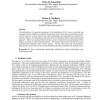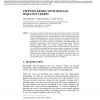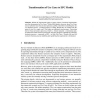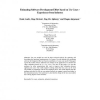127
click to vote
JAISE
2010
14 years 8 months ago
2010
This paper makes a number of contributions to the field of requirements analysis for Smart Homes. It introduces Use Cases as a tool for exploring the responsibilities of Smart Home...
127
click to vote
CLEIEJ
2010
14 years 11 months ago
2010
The performance of requirement engineers in the production of Use Cases is analyzed and compared using a collaborative editor in synchronous mode versus one in asynchronous mode, ...
122
click to vote
FORTE
2001
15 years 3 months ago
2001
Use cases are useful in various stages of the software process. They are very often described using text that has to be interpreted by system designers. This could lead to implemen...
125
click to vote
EPK
2006
15 years 3 months ago
2006
: Within the requirements phase of many projects, functional requirements are often documented as Use Cases. Within SOA projects, however, these Use Cases are not sufficient since ...
100
click to vote
BIS
2007
15 years 3 months ago
2007
Abstract. Use cases are a popular way of specifying functional requirements of computer-based systems. Each use case contains a sequence of steps which are described with a natural...
110
click to vote
ICFEM
2000
Springer
15 years 5 months ago
2000
Springer
Use Cases are a wide-spread informal method for specifying the requirements of a technical system in the early development phase. Z is a formal notation which aims to support, bes...
116
click to vote
ICOST
2010
Springer
15 years 6 months ago
2010
Springer
While people have many ideas about how a smart home should react to particular behaviours from their inhabitant, there seems to have been relatively little attempt to organise this...
113
click to vote
TOOLS
1999
IEEE
15 years 6 months ago
1999
IEEE
One of the beauties of use cases is their accessible, informal format. Use cases are easy to write, and the graphical notation is trivial. Because of their simplicity, use cases a...
113
click to vote
UML
2001
Springer
15 years 6 months ago
2001
Springer
Use case models are used in object-oriented analysis for capturing and describing the functional requirements of a system. Several methods for estimating software development effor...
OOIS
2001
Springer
15 years 6 months ago
2001
Springer
Use cases are often perceived as an integral part of an objectoriented approach to software development, yet despite claims that objects fall naturally from the use case descripti...




